Micromegas and Other Short Fictions (Penguin ed.) Read online
Page 5
‘Where am I, and who are you?’ cried out Mélinade in the first flush of surprise.
‘You are with the wretch who had the good fortune to save your life, and who has been so well rewarded for his troubles.’
Mélinade, as pleased as she was astonished, regretted only that the metamorphosis of Mesrour had not commenced earlier. She now walked up to a shining palace which dazzled her sight, and read this inscription upon the doors: ‘Withdraw, all ye profaners; these gates shall open only for the master of the ring.’ Mesrour in turn approached and read the same inscription, but the characters he saw were different, for he read these words: ‘Knock without fear.’ He knocked, and immediately the doors opened thunderously by themselves. The lovers entered a vestibule of Parian marble, to the accompaniment of a thousand voices and a thousand instruments; from whence they passed into a superb hall, where a delicious feast had been awaiting them for twelve hundred and fifty years without any of the dishes going cold: they sat down to eat, and were each waited on by a thousand slaves of the finest beauty; the meal was punctuated with music and dancing; and when it was finished, all the genies arrived in strictest order, divided into different groups, wearing costumes as magnificent as they were extraordinary, to take an oath of allegiance to the master of the ring, and to kiss the sacred finger that wore it.
Meanwhile back in Baghdad there lived a very devout Muslim who, unable to go and wash in the mosque, used to have the sacred water brought to his house in return for a small consideration paid to the priest. He had just finished his fifth ablution, in preparation for the fifth prayer; his servant, a far from devout young scatterbrain, got rid of the water by throwing it out of the window. It fell on to an unfortunate wretch propped sound asleep against a milestone. He woke up drenched. It was poor Mesrour, who, returning from his enchanted sojourn, had left behind the ring of Solomon in the course of his travels. He had also left behind his magnificent garments, and resumed his smock; his beautiful golden quiver was changed into a wooden porter’s hook, and, to crown his misfortunes, he had left the other eye behind. He now remembered that the night before he had drunk a large quantity of eau de vie, which had lulled his senses and fired his imagination. Having hitherto enjoyed a taste for this liquor, he now began to entertain an admiring gratitude for it, and returned gaily to work, firmly resolved to use his wages to acquire the means of meeting up again with his precious Mélinade. Another man would have lamented his one wretched eye after having experienced so fine a pair, or have felt the rebuffs of the palace sweepers after having enjoyed the favours of a princess more beautiful than the mistresses of the Caliph; or have resented being at the beck and call of every Baghdad householder after having reigned over the legions of genies – but then Mesrour lacked the eye which looks on the bad side of things.
Cosi-Sancta
A Small Ill for a Greater Good
An African Tale
It is a falsehood universally acknowledged, that we may not commit a small ill in order to secure a greater good. St Augustine was entirely of this opinion, as may be seen from this account of a little episode which occurred in his diocese during the proconsulate of Septimus Acindynus, and described in The City of God.1
At Hippo2 there lived an old parish priest, a great promulgator of brotherhoods and confessor to all the young girls of the neighbourhood, and with the reputation of being inspired by God because he dabbled in fortune-telling, an occupation in which he did quite well.
One day they brought him a young girl named Cosi-Sancta, the most beautiful in the whole province. Her father and mother were Jansenists,3 who had raised her in the strictest virtue; not one of all her suitors had been able to cause her a moment’s distraction from her prayers. She had been betrothed a few days earlier to a wizened old creature named Capito, an adviser to the minor appeals court of Hippo. He was a peevish surly little man, not without wit but stiff in conversation, sneering and much given to hoaxes – jealous moreover as a Venetian,4 whom nothing in the world could induce to be on terms with his future wife’s admirers. The poor young creature was doing all she could to love him, because he was to be her husband; she was trying with the best will in the world, but with little success.
She went to consult the parish priest to discover whether her marriage would be happy. The old fellow told her in prophetic tones: ‘Daughter, your virtue will cause many misfortunes, but one day you will be canonized for being three times unfaithful to your husband.’
This oracle astounded and cruelly embarrassed the innocent and beautiful girl. She wept; she asked for an explanation, thinking that these words concealed some mystical sense; but the only explanation forthcoming was that the three times were not to be taken to mean three rendezvous with the same lover, but three separate adventures.
Cosi-Sancta protested vehemently; she even directed some imprecations at the priest, and vowed she would never be made a saint. But she was, as we shall see.
Soon afterwards she was married; the wedding was thoroughly romantic; she successfully endured the unpleasant speeches she had to listen to, the insipid innuendoes and ill-disguised vulgarities by which the modesty of young brides is commonly affronted. She danced graciously with a succession of very handsome and well-built young men, but who displayed the worst possible grace in her husband’s opinion.
She went to bed beside little Capito with a certain repugnance, spent the greater part of the night asleep and woke up in a rather dreamy state. Her husband was less the subject of her reflections, however, than a young fellow named Ribaldos, who had occupied her mind without her knowing it. This young man seemed moulded by the hands of Love; he had all the requisite charms, audacity and knavishness; he was somewhat indiscreet, but only in the company of those who wished him well, and he was the darling of Hippo. He had set all the women of the town against each other, and all the husbands and mothers against himself. He usually fell in love without thinking, or just out of vanity; but he was in love with Cosi-Sancta by inclination, and he loved her all the more desperately because in this case the conquest was so fraught.
Being a resourceful man, he attempted first to make himself agreeable to the husband, to whom he made a thousand overtures, praising his looks, his easy and gallant wit, losing money to him at cards, and every day finding some little personal confidence or other to share with Capito. Cosi-Sancta thought him the most charming young man. She was already more in love with him than she realized; she did not suspect this, but her husband suspected it for her. Although he had all the vanity of a little man, he did not fail to suspect that Ribaldos’s visits were not being paid to him alone. So he found some pretext for a quarrel and forbade Ribaldos the house.
Cosi-Sancta was very vexed by this but dared not say so; and Ribaldos, rendered more amorous still by these difficulties, spent all his time on the look-out for opportunities to see her. He disguised himself as a monk, as a female pedlar, as a Punch and Judy showman; but not enough to conquer his mistress, and too much not to be recognized by her husband. Had Cosi-Sancta been in league with her lover they would have taken enough precautions for the husband not to suspect a thing; but since she struggled against her inclinations and had nothing to reproach herself with, she saved everything except appearances, and her husband believed the worst of her.
The little fellow, who was given to fits of rage and imagined that his honour depended on his wife’s fidelity, insulted her cruelly and punished her for being thought beautiful. She found herself in the most unpleasant situation available to a woman: unjustly accused, maltreated by a husband to whom she was faithful, and racked by a violent passion which she was trying nonetheless to overcome.
She thought that if her lover ceased his pursuit her husband might cease his injustices, and she would be tranquil enough to cure herself of a passion which had nothing further to feed upon. With this in mind, she ventured to write the following letter to Ribaldos:
‘If you have any virtuous feelings, desist from making me unhappy: you love me
, and your love exposes me to the suspicions and violence of a master to whom I have given myself for the remainder of my life. Would to heaven that this were the only risk I have to run! Pity me and cease your pursuit; I beg you by the love which has created your unhappiness and mine, and which can never bring you happiness.’
Poor Cosi-Sancta had not foreseen that a missive so tender, while at the same time so virtuous, would have an effect exactly contrary to what she hoped for. It inflamed her lover’s heart yet further, and he resolved to risk his life to see his mistress.
Capito, who was fool enough to want to know everything, and who had good spies, was tipped off that Ribaldos had disguised himself as a Carmelite friar mendicant come to beg alms of his wife. He now thought himself lost, knowing that a friar’s habit is more dangerous than any other to the honour of a husband. He posted his servants to give Brother Ribaldos a thrashing, and in the event was served only too well. When the young man entered the house he was greeted by these gentlemen; in spite of his cries that he was an honest Carmelite and that this was no way to treat poor monks, he was beaten and died a fortnight later from a blow to the head. All the women of the town mourned him; Cosi-Sancta was inconsolable; even Capito was contrite, though for different reasons, since he now found himself with a very unpleasant affair on his hands.
Ribaldos had been a relative of the proconsul Acindynus. This Roman decided to inflict an exemplary punishment for the assassination; and, since he had quarrelled more than once with the appeals court of Hippo, he was not displeased to be in a position to hang one of their number, and decidedly pleased that the punishment should fall upon Capito, who was by far the vainest and most intolerable popinjay of a judge in the province.
So Cosi-Sancta had seen her lover murdered and was about to see her husband hanged, and all because she had remained virtuous; for, as I have said already, had she granted her favours to Ribaldos, the husband would have been far more effectively deceived.
Thus the first part of the priest’s prediction was accomplished. Cosi-Sancta now remembered the oracle, and greatly feared she might have to accomplish the rest of it. But, reflecting that no one can escape their destiny, she abandoned herself to Providence, which wound her to its ends by the most honest means possible.
The proconsul Acindynus was a man more debauched than voluptuous, with little time for preliminaries, brutal, over-familiar, a real garrison hero, greatly feared in the province, and with whom all the wives in Hippo had had dealings solely to avoid crossing him.
He sent for Madame Cosi-Sancta: she arrived in tears, which made her seem all the more charming. ‘Your husband, madam,’ said he, ‘is to be hanged, and it’s down to you to save him.’ ‘I would give my life for his,’ said the lady. ‘That is not what is required of you,’ replied the proconsul. ‘Then what must I do?’ said she. ‘I want just one night with you,’ replied the proconsul. ‘But my nights are not mine to give,’ said Cosi-Sancta, ‘they belong to my husband. I would give my blood to save him, but not my honour.’ ‘But suppose your husband consents?’ said the proconsul. ‘He is my master,’ replied the lady, ‘and one does as one pleases with one’s property. But I know my husband, and he will never consent; he is a stubborn little man, quite capable of letting himself hang rather than let anyone else touch me with the tip of their finger.’ ‘We shall see about that,’ said the judge in a rage.
He had the criminal brought before him immediately: he offered him the choice of being hanged or cuckolded: there was little room for debate. Even so, the little fellow needed a lot of persuading. At last he did what anyone else would have done in his place. His wife charitably saved his life; and this was the first of three.
The same day her son fell ill with a very rare malady unknown to all the doctors of Hippo. There was only one doctor who knew the cure, but he lived in Aquila, several leagues from Hippo. At that time it was forbidden for a doctor established in one town to exercise his profession in another. Cosi-Sancta was herself obliged to go to Aquila with her brother, whom she loved tenderly. On the road they were held up by brigands. The leader of these gentlemen found her very pretty; and, since they were about to kill her brother, he went up to her and suggested that were she to be a little accommodating her brother would be spared, and it would cost her nothing into the bargain. The case was urgent: she had just saved the life of a husband for whom she had little love; she was about to lose a brother whom she loved a great deal; moreover the dangerous condition of her child alarmed her; there was not a moment to lose. She commended herself to God and did all that was required of her; and this was the second of three.
She reached Aquila the same day and alighted at the doctor’s house. He was one of those fashionable doctors who are sent for by women who have the vapours, or who have nothing at all. He was the lover of some and the confidant of others; a polite, obliging gentleman, rather out of favour with the Faculty of Medicine, about whom he had been known to make very good jokes.
Cosi-Sancta explained her child’s illness and offered a whole sestertium. (You will note that a whole sestertium was worth well over a thousand écus in today’s money.) ‘It is not in such currency, Madame,’ said the gallant doctor, ‘that I prefer to be paid. I would for my part offer you all I am worth, were it to your taste to be remunerated for the cures which you alone can effect; only cure me of the malady you have caused, and I shall restore your child to health.’
The lady thought the proposition bizarre; but fate had by now accustomed her to strange things. The doctor was an obstinate gentleman who would take no other price for his services. Cosi-Sancta had no husband at hand to consult; and how could she allow the child she adored to die for lack of the trivial assistance that was hers to give! She was as good a mother as she was a sister. She purchased the cure at the asking price; and this was the last of three.
She returned to Hippo with her brother, who kept thanking her, along the way, for the courage with which she had saved his life.
Thus, Cosi-Sancta through being too virtuous caused her lover to be murdered and her husband condemned to death; and, by being accommodating, saved the lives of brother, son and husband. It was widely considered that such a woman was essential to any family. After her death she was made a saint, because by mortifying herself she had done so much for her nearest and dearest, who had the following motto carved on her tombstone: ‘A Small Ill For A Greater Good.’
Micromégas
A Philosophical Story
CHAPTER I
Voyage of an inhabitant of the star Sirius
to the planet Saturn
On one of those planets which orbit the star named Sirius there lived a young man of great intelligence, whom I had the honour of meeting during the last visit he made to our little ant hill; he was called Micromégas, a most suitable name for any man of parts. He was eight leagues tall: by which I mean twenty-four thousand geometrical paces, each measuring five feet.
A number of the algebraists, people ever useful to the public, will now reach for their pens and discover that, since Monsieur Micromégas, inhabitant of the land of Sirius, measures twenty-four thousand paces from tip to toe (the equivalent of one hundred and twenty thousand royal feet), and since we on Earth measure scarcely five feet and our globe is nine thousand leagues in circumference, they will find, as I say, that the globe which fostered him must be exactly twenty-one million, six hundred thousand times greater in circumference than our little Earth.1 Nothing in nature could be simpler or more straightforward. To compare the territories of certain German or Italian sovereigns – which may be toured in half an hour – with the Turkish or Muscovite or Chinese empires, would be to give but a feeble idea of the prodigious differences which nature has contrived between all her creatures.
His Excellency’s height being as I have stated, our sculptors and painters will all readily agree that his waist probably measures fifty thousand royal feet; which makes for very handsome proportions.
As to his mind, it was among th
e most cultivated in existence; he knew a great number of things, some of which he worked out for himself: while not yet two hundred and fifty years of age and still a pupil at the Jesuit college of his planet (as was the custom), he independently solved more than fifty of Euclid’s Problems. Which is eighteen more than Blaise Pascal, who solved thirty-two of them for his own amusement (or so his sister says), only to develop into a fairly average geometer and a very poor metaphysician.2 By the age of four hundred and fifty, as childhood was drawing to a close, Micromégas was busy dissecting quantities of those tiny insects which are scarcely a hundred feet in diameter and invisible under ordinary Sirian microscopes. He wrote a most original work on the subject, which nonetheless landed him in trouble. The local Mufti,3 a celebrated pedant and ignoramus, found some of the arguments in this book to be suspect, offensive, reckless, and unorthodox to the point of heresy. He proceeded against it vigorously. The case turned on whether the substantial form of the fleas on Sirius was of the same nature as that of the snails. Micromégas mounted a spirited defence; he won over all the ladies; the trial lasted two hundred and twenty years. At last the Mufti had the book condemned by jurists who had not opened it, and the author was ordered not to show his face at court for the next eight hundred years.
He was only moderately grieved to be banished from a court so full of squabbling and petty intrigue. He wrote a very amusing song about the Mufti, who was not especially bothered; after which he set out on a voyage from planet to planet to complete his education ‘in heart and mind’, as the saying goes. Those who travel only by post-chaise or berlin coach will no doubt be amazed at the methods of transport in the world above: down here on our little mud-heap4 we have no conception of customs other than our own.
Our traveller was wonderfully acquainted with the laws of gravity and with all the forces of attraction and repulsion.5 These he put to such use that, sometimes with the aid of a sunbeam, at other times through the convenient offices of a comet, he and his retinue went from one globe to the next as a bird hops from branch to branch. He travelled the length of the Milky Way in no time at all, though I am bound to record that not once on his way past the stars with which it is strewn did he glimpse the lovely empyreal heaven which the celebrated Reverend Derham6 boasts of having seen at the end of his telescope. I do not suggest that the Reverend Derham has poor eyes, Heaven forbid! But Micromégas was there in person, is a good observer, and… I have no wish to contradict anyone.

 Zadig/L'Ingénu
Zadig/L'Ingénu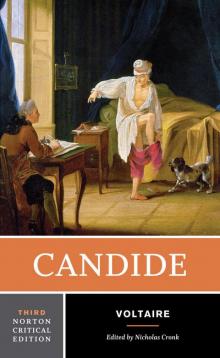 Candide
Candide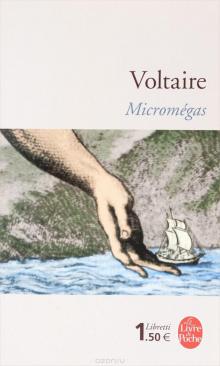 Micromegas
Micromegas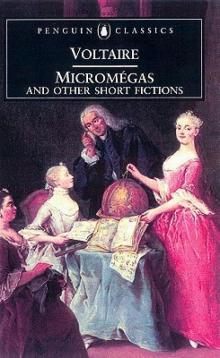 Micromegas and Other Short Fictions (Penguin ed.)
Micromegas and Other Short Fictions (Penguin ed.)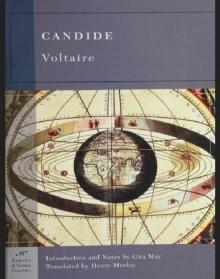 Candide (Barnes & Noble Classics Series)
Candide (Barnes & Noble Classics Series)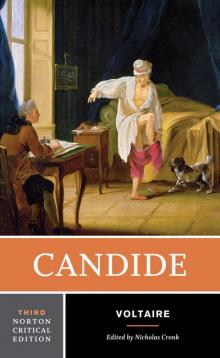 Candide (Third Edition) (Norton Critical Editions)
Candide (Third Edition) (Norton Critical Editions) Zadig or L'Ingenu
Zadig or L'Ingenu